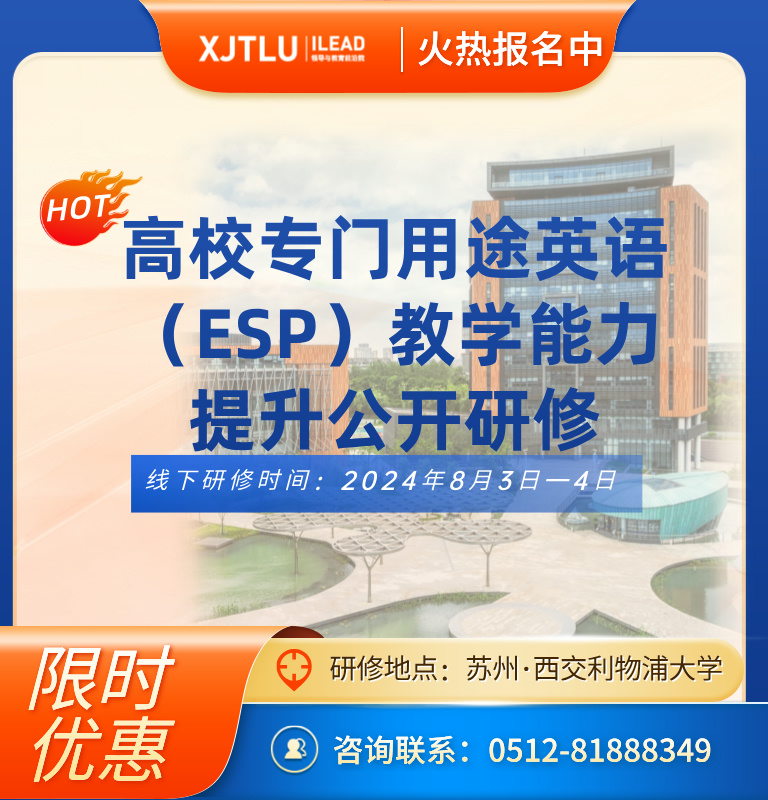About
Programme Background
Internationalisation in higher education is accelerating and this means that the demand for courses that are taught in English has also risen across Asia very rapidly. These courses require the support of professional English for Academic Purposes teachers, who can prepare their students for the communicative challenges that lie ahead. Our students need to cultivate 21stCentury skills, and amongst these are academic writing and speaking skills, as well as the ability to fully participate in their studies and to be able to join their disciplinary communities. To this end, the traditional College English curriculum and techniques, that have long been practised in China, are, in many contexts, moving towards more skills-based, up to date EAP programmes. This requires new techniques, knowledge and even a new professional identity for teachers transitioning from being English teachers, to becoming EAP practitioners. This course has been established to help teachers and academics with that transition.
Core Objectives
Our EAP teaching model is to foster a student-centred active learning environment grounded in your students’ actual needs. On the course you will receive practical training in how to design and deliver an EAP curriculum. You will carry out micro-teaching practice with your fellow trainees and reflect upon your practice. You will also engage in a discussion of the role and position of the EAP professional and the linguistic theories that underpin this role.
Specific Objectives Include
-
Understand the challenges of English teaching for academic purposes, underpinned by a disciplinary specific approach;
-
Practice, share and discuss a student-centred active learning (SCAL) approach to the EAP classroom;
-
Develop the teaching skills required to help students become successful academic communicators to be able to adopt their specific disciplinary identities;
-
Consider how to create and develop new EAP courses, in a staged and principled way, from student needs to classroom activities;
-
Consider aspects of assessment, giving effective feedback, selecting appropriate learning and teaching materials and usaing learning technologies effectively.
Who Can Participate
-
The CTEAP is aimed at teachers:
-
from China and overseas
-
who are currently teaching in higher education but wish to specialise in EAP
-
looking to position themselves as leaders in their institutions
-
who wish to enter into teaching in higher education
-
at Chinese institutions looking to teach more EAP in future
-
high school teachers preparing their students for higher education.
Core Themes
The EAP teacher as language expert
This module discusses the meaning of EAP through real examples, as well as the significance of being an EAP teacher at a university level, and how this affects our professional identities. We introduce the importance of specific academic discourse communities to the EAP teachers and their students, and how to deal with this on a practical level.We emphasise here the importance of discipline-specific text analysis and discuss how to do this with our students.
Classroom practice
This module explores the practicalities of being an EAP professional, including classroom management, classroom activities, motivating learners, teaching grammar, error correction, task setting, and giving feedback. This also briefly explores how to use the linguistic theories in the classroom to help students express their ideas more clearly.
Teaching the language skills
This module explores the reading and writing skills in EAP teaching and how to develop students' critical thinking, and also study how to teach key speaking skills, including presentation skills. This takes an integrated skills approach to improve students' four traditional communication skills since they do not happen in isolation.
EAP course design and assessment
This module deals with overall planning of EAP courses and how they are assessed. It explores how as an EAP courses are designed, from students’ needs, through learning outcomes, assessment and into the classroom. It focuses on setting assessed writing and speaking tasks and writing integrated skills tests and how to teach towards these. It also discusses the best way to consistently and fairly mark students’ assignment and give feedback.
Teaching materials and technology
This module explores how to create new learning materials and adapt published materials for the EAP classroom, as well as finding materials online for research and learning purposes. We will also look at the latest technologies that can be used in the EAP classroom.
Contact us
Mr.Wang 0512-80884655
Shuo.Wang@xjtlu.edu.cn
We will confirm your registration by email and inform you of the payment method within one week after registration. There are 40 people in the program and the quota is limited. Please register as soon as possible.
Client Feedback
-
Na Li, 2018
The design of student-centered teaching and learning and the cultivation method of critical thinking inspires me.
-
Yang Na, 2017
I believe that the CTEAP training course has improved my understanding and practical teaching skills as an EAP teacher to a great extent. Thanks to the training, my current teaching is very different from my previous one.
-
Frank Yang Chuan, 2017
CTEAP training is useful for me in several ways. First, it helped me gain a comprehensive and in-depth understanding of EAP courses in their own rights within and across disciplinary domains. Apart from that, the workshop offered many valuable suggestions on syllabus and activity design... To make this experience even more rewarding is the opportunity to get to know EAP teachers from across the country, their stories enable me to reflect on my own circumstances, particularly with where I was and where I am going in teaching profession.
-
Joanne Ningjuan Wang, 2016
The things I learned from this training are like wings which will enable me to fly higher and further in the realm of EAP.
-
Joanne Ningjuan Wang, 2016
The stuff I learned from this training are like wings which will enable me to fly higher and further in the realm of EAP.
-
Alex Guihe Zhao, 2016
The course was very inspiring, enlightening, and interesting not only providing theoretical knowledge, but also integrating very practical activities into each session. From this course, I know more concepts about EAP and it will benefit my future teaching as well as my career development. I benefit a lot from this excellent training course.
-
Frankie Wng Yang, 2017
Has the CTEAP been useful to you as an EAP professional? How and why? Absolutely, YES! All the major development must be with EAP, because the international language is English, most of the important research or article comes from English version.
-
Stella Puxia Jin, 2016
The training has enriched my confidence and pride as an EAP teacher.
-
Kris Wright, 2017
Not only has CTEAP given me additional confidence and professional contacts at a time when I needed constructive feedback on my skillset both positively and assistive, but the program has also informed on leadership qualities… I had the opportunity to present and … coaching to improve in this ability with several practice sessions. This coaching had additional value due to the quality of those giving the feedback. I had already observed their ability to incorporate leadership in their coursework they were presenting to us. The class dynamic was positive and informative throughout the coursework.
-
Rebecca Yuyun Shang, 2016
I realised CTEAP is a wholly new concept for English teaching and learning, different from the traditional way. I think the key factor for a successful class is hot to motivate learners and get involved into the class, cultivate their critical thinking and developing good learning habits and behaviour which will be beneficial for learners throughout their lives. All these teaching concepts will bring more inspiration and innovation into my real classes.
-
Gong Xun, 2017
CTEAP has been useful to me as an EAP professional since it has offered me an clear navigating map about EAP, including the objective, methodology and assessment. If I may, to take me as an example, as a newly onboard EAP teacher, the CTEAP has managed to provide me with new concepts about EAP to re-position myself in the EAP teaching from a traditional English teacher to an English language specialist, with the means of offering students new ideas about EAP. For me, CTEAP has been an impressive pleasure of study, I personally enjoyed the process, thanks to all the flexible and constructive teaching methods from the professors from XJTLU. Not only have the different perspectives of native speakers regarding EAP been shared, but also the efficient pedagogic methodology and profound teaching philosophy have been delivered to the students including me. CTEAP will definitely contribute to my practice and future career by providing me a clear blueprint regarding how to be an EAP teacher as well as an English language specialist.
-
Leo Fei Wang, 2016
I really enjoyed it. The teachers of CTEAP were very professional and easy going and they spared no effort to help us to improve our teaching ability and create a fantastic learning and teaching community in these weeks.
-
Yang Na, 2017
I believe that the CTEAP training course has improved my understanding and practical teaching skills as an EAP teacher to a great extend. Thanks to the training, my current teaching is very different from my previous one. That is, my teaching supports students’ studying in their specific majors more.
-
Sue Jingna Zhao, 2016
The lectures are informative, flexible, academic, practical and inspiring.
-
Yang Aixin, 2017
I do enjoy the CTEAP, because it does help to improve my teaching by equipping me with precious academic knowledge and providing me with chances for effective microteaching practice. Moreover, great opportunities are given to the academic professionals with different backgrounds to share their thoughts with each other. I do believe that the CTEAP will contribute to my practice and my future career, as it provides guidance and directions for how to design and deliver a better course.
-
Yuan Zhenfang, 2017
To be specific, I will teach the writing next semester. I think the content of writing in the training are very useful for me because I don’t have any clue about teaching writing before I went to Suzhou… The teacher’s teaching way has big effect on the students’ writing… I realize writing can be taught in such simple and clear way. It’s not so difficult to teach as I thought before. And now I will combine the methods I got from the training to my class.



